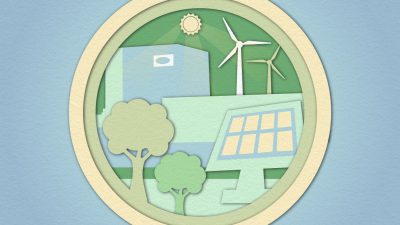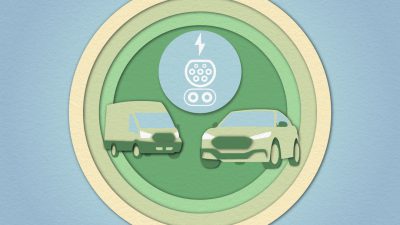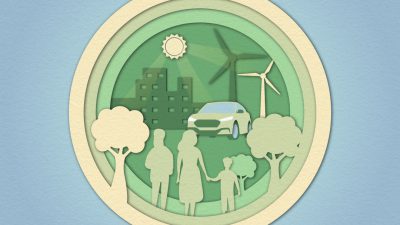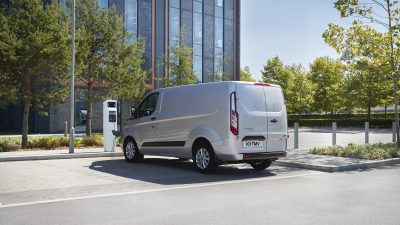- Ford stelt twee nieuwe wetenschappelijk onderbouwde tussentijdse CO2-emissiedoelstellingen
- Science Based Targets-initiatief (SBTi) onderschrijft Fords wereldwijde doelstellingen voor 2035: het verminderen van de totale uitstoot van broeikasgassen met 76% van zijn activiteiten en 50% per gereden kilometer door nieuw verkochte voertuigen
- Alle nieuw verkochte Ford personenauto’s in Europa zullen in 2030 volledig elektrisch zijn; Ford investeert $ 1 miljard in een nieuw EV productiecentrum in Keulen en begint met levering van Mustang Mach-E
Ford bouwt hard aan een betere wereld voor toekomstige generaties. Zo heeft Ford in de Integrated Sustainability and Financial Report 2021 belangrijke doelstellingen voor de uitstoot van broeikasgassen aangekondigd: doelen die het bedrijf zullen helpen om in 2050 koolstofneutraliteit te bereiken. Lees verder
Downloads
Ford heeft de aanpak van het Science Based Targets-initiatief (SBTi) gebruikt om tussentijdse emissiedoelstellingen vast te stellen. Deze zijn in lijn met wat klimaatwetenschappers meest recent nodig achten om de doelstellingen van de Klimaatovereenkomst van Parijs te halen.* De doelstellingen voor 2035 bestaan uit: het terugdringen van de uitstoot van wereldwijde bedrijfsactiviteiten met 76 procent en het met 50 procent terugdringen van de uitstoot per kilometer van nieuwe voertuigen die wereldwijd worden verkocht.
Lees het bericht hieronder verder in het Engels:
Key to the reduction of emissions is the development of electrified vehicles. Ford’s strategy in Europe is to go all-in on electrification, with passenger vehicles to be all-electric by 2030. For commercial vehicles, Ford’s product range in Europe will be zero-emissions capable, with all-electric or plug-in hybrid offerings, as early as 2024.
Spearheading the move to electric is the $1 billion investment to transform the company’s vehicle assembly facility in Cologne into a centre for the manufacture of electric vehicles, Ford’s first such facility in Europe. Also, the next generation Ford Transit Custom range will include all-electric models built by Ford Otosan in Turkey, further advancing Ford’s electrification strategy and commercial vehicle leadership in Europe.
“We will lead in achieving carbon neutrality because it’s the right thing for customers, the planet and for Ford,” said Bob Holycross, chief environment and sustainability and safety officer, Ford Motor Company. “Ninety-five per cent of our carbon emissions today come from our vehicles, operations and suppliers, and we’re tackling all three areas with urgency and optimism.”
The company’s 2050 carbon neutrality goal is aligned with the Paris Climate Agreement, which the US recently recommitted to and Ford fully supports.
Shifting to a single Integrated Report for the first time increases transparency and provides a more holistic view of the company’s success. The report describes how Ford’s sustainability and business ambitions and accomplishments align with the company’s purpose – to build a better world where every person is free to move and pursue their dreams, innovating to expand opportunity and building the future for generations to come.
Electrifying the future
Ford is focussed on investing in electric vehicles, autonomous vehicles and connected solutions. The company recently doubled the investment in electric vehicles to $22 billion through 2026 as Ford continues to electrify some of its most popular nameplates – including the highly anticipated Mustang Mach-E SUV, which rolled out in North America in late 2020, followed by Europe in early 2021, and will arrive in China later this year.
In addition to the $1 billion investment to transform the company’s vehicle assembly facility in Cologne into a centre for the manufacture of electric vehicles, construction has already begun on the new Rouge Electric Vehicle Center in Dearborn, in the US, where the all-electric F-150 pick-up truck will be built. These investments – together with another $1 billion announced in February to transform operations in Pretoria, South Africa – will further help reduce Ford’s overall carbon footprint.
Building on our success and setting new goals
Ford has a strong history in making its operations more sustainable. Over the past decade, Ford has achieved a 40 per cent reduction in the carbon footprint through improved energy efficiency and conservation at company facilities, as well as manufacturing processes. Ford’s objective of using 100 per cent locally sourced renewable electricity for all manufacturing plants by 2035 is on track and is closely linked with its commitment to electrified vehicles.
Along with the commitment towards zero waste to landfill through the “reduce, reuse, recycle” model and eliminating single-use plastics, the company’s global manufacturing water strategy targets a 15 per cent reduction in absolute freshwater by 2025 from the 2019 baseline, building on the 75 per cent reduction since 2000.
Endorsed by the SBTi, the two targets for 2035 were developed to reduce near-term emissions, addressing the urgency of climate change while helping Ford achieve the ambitious long-term goal of carbon neutrality by 2050:
- Reduce absolute Scope 1 and 2 greenhouse gas emissions from global operations by 76 per cent from a 2017 base year. Scope 1 covers direct emissions from company-owned or -controlled sources. Scope 2 addresses indirect emissions from the generation of purchased electricity, steam, heating and cooling used by Ford.
- Reduce Scope 3 greenhouse gas emissions from use of new vehicles globally sold by 50 per cent per kilometre from a 2019 base year. Scope 3 includes in-use emissions from vehicles that Ford sells and emissions from its supply base, among others.
Taking care of people
Ford is committed to respecting human rights through all aspects of the supply chain. Earlier this year, the company produced a Supplier Code of Conduct, outlining the expectations and standards required of our supply chain partners, and also became the first American automaker to join the Initiative for Responsible Mining Assurance, or IRMA, for the responsible sourcing of the raw materials used in automotive production.
Additionally, Ford’s supply chain activities are being audited by the Responsible Business Alliance with regards to corporate social responsibility.
In Europe, Ford is now a lead partner of “DRIVE Sustainability”, an automotive manufacturers’ initiative to address ethical, environmental and labour rights issues at all levels of the supply chain.
Rising to the challenge
During the past year, Ford has played an integral role in using design and manufacturing expertise, as well as existing vehicle parts, to help produce thousands of units of medical equipment such as ventilators and respirators, in response to the COVID-19 pandemic.
In 2020, the initiative produced nearly 100 million face masks, 20 million face shields, 50,000 patient ventilators, 1.6 million washable isolation gowns and, in a collaboration with 3M, more than 32,000 powered air-purifying respirators. Additionally, through its Ford Motor Company Fund philanthropic arm, Ford distributed more than 55 million face masks to non-profit organisations, Ford dealers, government agencies, schools and first responders in all 50 US states during the last five months of the past year – part of a commitment to contribute 120 million masks to at-risk communities by the middle of this year.
In Europe, Ford Fund has provided almost $500,000 to non-profit organisations to support emergency relief efforts linked to food provision, medical equipment and protective clothing, IT and virtual resources, and advisory services, amongst other needs. Ford UK turned an empty warehouse into a production line to make key components for the 11,700 Penlon ventilators produced during the VentilatorChallengeUK.
“Ford remains committed to accelerating the drive toward electrified vehicles and achieving carbon neutrality,” said Stuart Southgate, director, Sustainability, Environmental and Safety Engineering, Ford of Europe. “The past twelve months have further emphasised the importance of taking care of our world and each other. It’s not a time to sit back. It’s time to act. We’re building the future now, as a better world for everyone.”
To read the full report, visit sustainability.ford.com.
###
* The Science Based Targets initiative is a collaboration between CDP, the World Resources Institute, the World Wide Fund for Nature and the United Nations Global Compact that helps companies set meaningful objectives for mitigating emissions.









